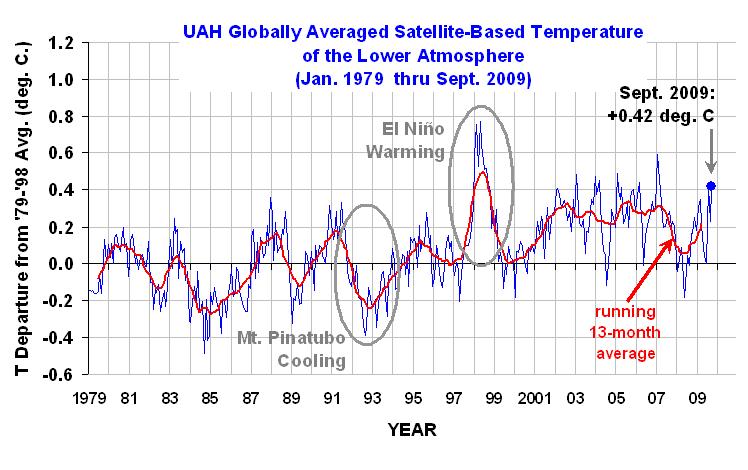We’re happy to report that global temperatures have stabilized. In fact, there is significant evidence that some key areas of the globe are getting markedly cooler.
Al Gore should be celebrating. He is not.
First, let’s visit the Antartic, where we have the following temperature trend.
A 30-year minimum Antarctic snowmelt record occurred during austral summer 2008–2009 according to spaceborne microwave observations for 1980–2009. Strong positive phases of both the El-Niño Southern Oscillation (ENSO) and the Southern Hemisphere Annular Mode (SAM) were recorded during the months leading up to and including the 2008–2009 melt season.
Figure 1. Standardized values of the Antarctic snow melt index (October-January) from 1980-2009 (adapted from Tedesco and Monaghan, 2009).
You can read more about this chart here.
Meanwhile, the oceans are getting noticeably cooler, especially the Arctic, although it’s worth pointing out they are still warm compared to three decades ago.

So, how about the Arctic ice cover, something that especially worries global warming alarmists. Well, we had a pretty good year in 2009, although it is worth pointing out that the ice cover is relatively thin compared to some years in the past, but not as bad as the worst year, 2007.
Overall, when you look at satellite-based temperature trends, temperatures are slightly higher than the 1970s (which were so cold that many publications worried about a new ice age) but lower than the 1998 high.
Well, what about the IPCC and its famous hockey stick? If you’re reading this, I’m sure you’ve seen the alarming temperature trends that show temperatures going up in our days. Well, the problem is that there are serious problems with the data that were used to create the hockey sticks. You can read about it here.
We have reached a critical juncture. Despite Al Gore’s herculean efforts to stifle debate and declare the end of the world is near, the world is rejecting his message. A British court recently declared that “An Inconvenient Truth” is so misleading and inaccurate that it could not be shown in British schools without warnings. You can read the court’s opinion here.
Even the BBC, the longtime promoter of global warming alarmism, has had to admit that global temperatures have not gone up since 1998 and asks “what happened to global warming?”
Why do I care? Attempts to force worldwide government-led “solutions” to global warming are unnecessary and likely to be highly counterproductive. There is no reason to believe that we are in any kind of crisis. Any governmental solution will mean unnecessary higher taxes, and the Obama administration estimates them at more than $1700 per family. In addition, cap and trade means interference with businesses and additional costs, which will inevitably cause corporations to downsize. This is the last thing we need with unemployment approaching 10 percent.
